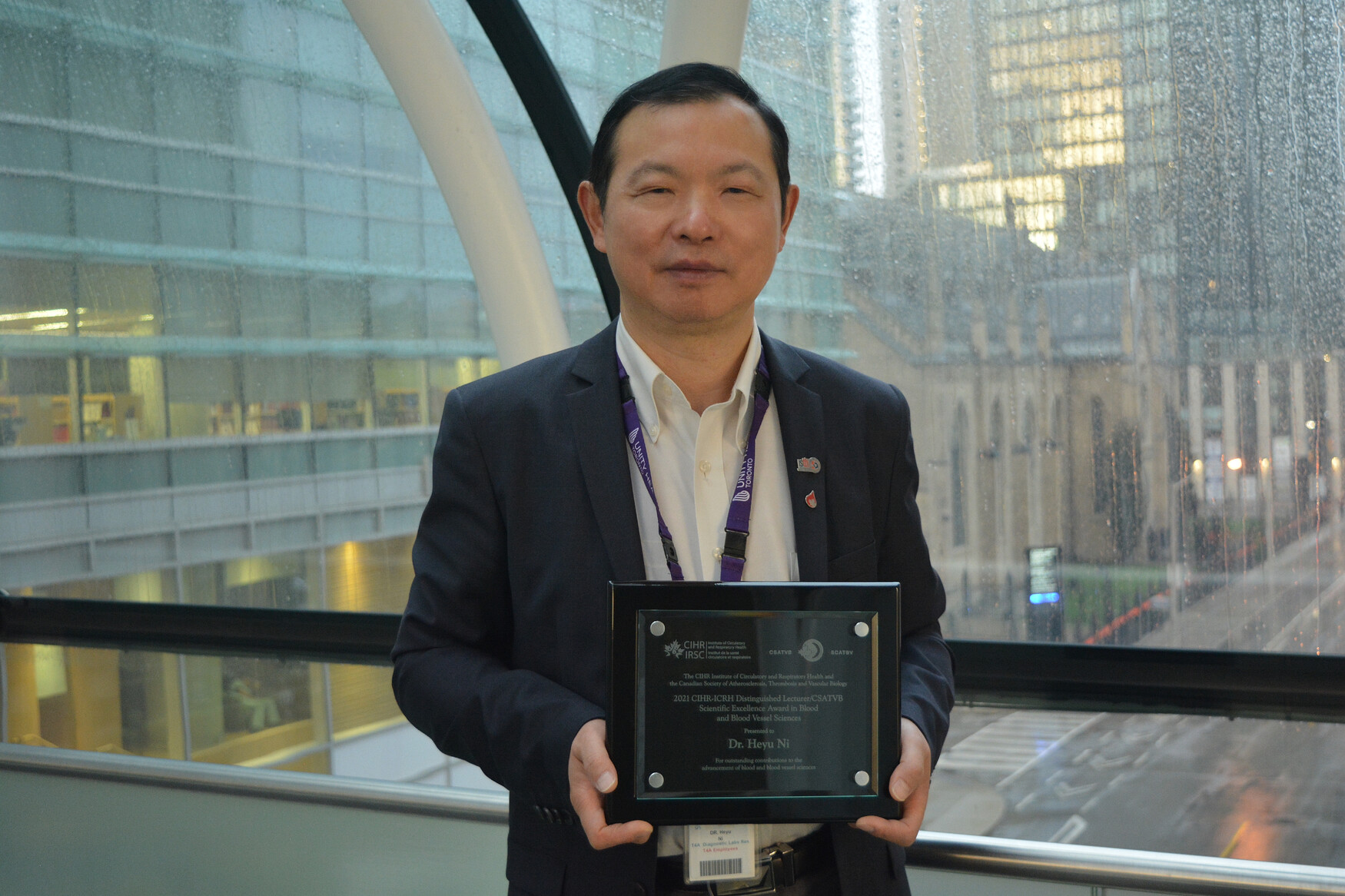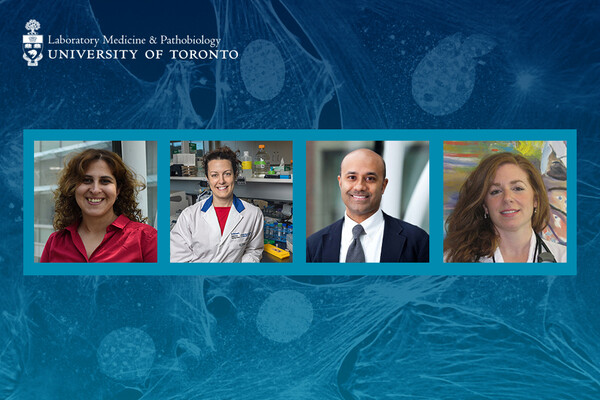Dr. Heyu Ni recognised for his advancement of blood sciences for improved patient outcomes

Dr. Heyu Ni has been awarded the 2021 Distinguished Lecturer / Scientific Excellence Award in Blood and Blood Vessel Sciences by the Canadian Society of Atherosclerosis, Thrombosis and Vascular Biology (CSATVB) and the CIHR Institute of Circulatory and Respiratory Health (CIHR-ICRH).
An expert in platelets, Dr. Ni investigates the role of adhesion molecules involved in clot formation as well as their implications for hemostasis (including bleeding disorders) and thrombotic diseases (i.e. heart attack and stroke). He is a Professor in the Department of Laboratory Medicine & Pathobiology, Platform Director the Keenan Research Centre for Biomedical Science at St. Michael’s of Unity Health Toronto, and Senior Scientist at Canadian Blood Services Centre for Innovation.
This award recognises the impact of his research in the advancement of blood sciences and clinical outcomes, as well as his role mentoring the next generation of scientists.
A lifetime of curiosity
“I was probably a terrible child”, laughs Dr. Ni, “I was always into everything, wanting to know how everything worked and why.”
This curiosity never left him. He became a physician after completing his MD in Anhui Medical University in China. It bothered him that he would treat patients, but they would inevitably end up returning as their ailments were never fully cured.
“I wanted to understand the pathology of what they were suffering from so I moved into research to gain that insight,” he explains. After completing an MSc in Microbiology and Immunology in China, he came to Canada to complete a PhD at The University of Manitoba, then a Post Doctorate at Harvard Medical School.
Defining the role of blood in our deadliest diseases
His PhD focussed on how adhesion molecules affected the immune system, which developed into an interest in the adhesion of platelets in the blood using intravital confocal microscopy (which allows researchers to look at how cells behave while they are in a living organism).
Now his research covers several areas, but the main foci are studying how cancer spreads in the body and treating the effects of atherosclerosis (where plaque, or fatty deposits, build up in your arteries) in heart attacks and strokes.
“Being an MD is very valuable,” explains Ni, “It allows me to conduct basic science that can have a direct therapeutic outcome. I always tell my students that we keep one eye on the discovery and the other eye on the patient.”
His innate curiosity allowed him to make a discovery which has changed how we look at platelet adhesion.
For over 50 years, it has been accepted scientific fact that platelets stick together when adhesion molecules and Fibrinogen (a protein in plasma) bond. In theory, if you remove the Fibrinogen protein, then there will be no platelet aggregation.
This has major implications for treatments for cardiovascular diseases, and possibly cancer. Cancer spreads through the body by ‘sticking’ to platelets so it can move in our blood stream, normally a hostile environment for it. Platelets and our coagulation process heal ruptures in arteries by sticking together – but too much ‘repair’ causes vessel blockages which lead to heart attacks and stokes so we need to find ways to control it.
Dr. Ni was curious to test the known theory of platelet aggregation and study it in living animals using intravital microscopy. He discovered that when blood samples are taken, researchers apply coagulants to keep them liquid. These coagulants remove the calcium in the adhesion molecules (which helps them function), giving a false result. It was not the removal of proteins that was having the effect: in vitro and in vivo, removal of Fibrinogen does not stop the platelets sticking together.
“The whole time, our actions had been clouding our knowledge – it took a different perspective to show what we had understood as fact, was actually incorrect,” states Ni, “It’s one of the most rewarding things about being a scientist. To know you’re the first to witness a discovery – nothing beats that feeling of satisfaction.”
Inspiring curiosity in others
Above all, Dr. Ni’s greatest passion is mentoring the next generation of scientists.
He teaches in several undergraduate and graduate courses in LMP and across the Temerty Faculty of Medicine, and has a large research group encompassing MSc and PhD candidates, and undergraduate summer students.
“This is what I love the most. To be able to spark and nurture that curiosity in others. Many of my students have gone on to be great researchers themselves, having their own impact on research and clinical care, which makes me incredibly proud.”
Recognition of decades of achievement
Awarded by a pan-Canadian committee, the Scientific Excellence Award recognises that Dr. Ni’s “discoveries and methods have fundamentally impacted diagnosis and therapy for bleeding disorders and significantly advanced the field of blood sciences.”
On receiving the award, Dr. Ni commented, “It is such an honour to receive this award. To have my work recognised by my colleagues, and for my contribution to the field to be appreciated in such a way is wonderful. I give thanks to the committee.”
Related news
Dr. Heyu Ni 's academic profile
Dr. Hey Ni is currently recruiting Postdoctoral Fellows. Based in his laboratory at St. Michael’s Hospital, you will be a recently graduated PhD student interested in thrombosis (mechanisms of heart attack and stroke, particularly in platelet biology), immune-mediated thrombocytopenia, and tumor metastasis. Contact Dr. Ni to enquire Heyu.Ni@unityhealth.to.
Dr. Heyu Ni was elected as a Fellow of the Canadian Academy of Health Sciences (CAHS) in the news story Faculty at LMP recognized through prestigious awards



